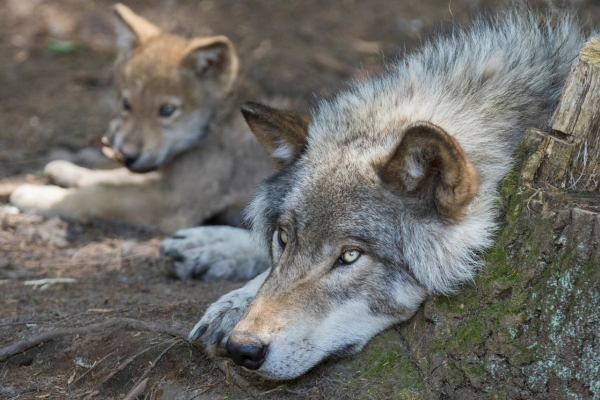Contact:
Dr. Francisco J. Santiago-Ávila, Science & Advocacy Director, Washington Wildlife First
Claire Loebs Davis, Executive Director, Washington Wildlife First
Seattle, WA – Washington Wildlife First is offering a $10,000 reward for information leading to the arrest and conviction of those responsible for the recent illegal killings of two federally protected gray wolves in western Washington. This reward adds to those already offered by the U.S. Fish & Wildlife Service and two other non-profit organizations, bringing the total to $40,000.
The recent rise in wolf poaching raises significant concerns about the future of wolf recovery in Washington, emphasizing the need to strengthen protections.
“The rise in the illegal killing of wolves shows us the fragility of the state’s wolf population,” said Dr. Francisco J. Santiago-Ávila, Science & Advocacy Director of Washington Wildlife First. “Overall mortality of wolves has reached alarming levels in the past few years, and if it continues to climb, we will start to see a reversal of all the progress we have made toward recovery.”
Both overall wolf mortality and wolf poaching have reached record levels in recent years. Over the past four years, there have been 24 reported incidents of illegal killing, compared to just nine reported over the prior nine years. Just in 2024, the Washington Department of Fish and Wildlife and the U.S. Fish and Wildlife Service opened investigations into nine illegal killings, and science suggests that undetected poaching may be substantially higher. Meanwhile, overall human-caused wolf mortality has soared from an average of 5 wolves a year from 2012 to 2020 to 34 wolves a year in 2021 through 2023 (the last year for which those numbers are available).
The two most recent incidents raise particular concern because they destroyed the Big Muddy pack, the only known wolves located in the Southern Cascades/Northwest Coast recovery zone. Under the state’s 2011 Wolf Recovery and Management Plan, there must be at least two breeding pairs in each of three recovery zones for at least three years, before wolves can be downlisted from endangered.
An adult male member of the Big Muddy pack was found dead in October 2024, east of the Klickitat River near U.S. Highway 142 and Goldendale in Klickitat County. The wolf had been shot and, unable to use its back legs, dragged itself to a water source before dying of starvation. On December 17, 2024, a second adult male pack member was found dead northeast of Trout Lake in Klickitat County. That wolf was the last member of the Big Muddy pack, as the only female wolf in the pack disappeared in 2023.
The recent surge in wolf mortality underscores the importance of the July 2024 vote by the Washington Fish and Wildlife Commission to reject a management proposal to prematurely downlist wolves before they had met recovery standards, maintaining their status as a state endangered species. There have been proposals in the state legislature that would overturn this decision and downlist wolves to a “sensitive” species. One impact of such a move would be to decrease the crime of illegally killing a wolf to a misdemeanor, punishable by a maximum of only 90 days in jail and a $1,000 fine.
“It would be dangerous to downlist wolves and decrease protections before they have met state recovery standards, especially because those standards are already minimal,” said Dr. Santiago-Ávila. “Department management based its recommendation to prematurely downlist wolves on a deeply flawed population model that underestimated the risks to wolves—but even that model shows that at current rates of mortality, wolves have only a 11% chance of achieving recovery over the next 50 years. That is unacceptable.”
Washington Wildlife First hopes that adding to the reward offered by U.S. Fish and Wildlife, the Center for Biological Diversity, and Conservation Northwest, might help encourage someone who has information about the killings to come forward.
Anyone with information about these incidents is encouraged to contact the U.S. Fish and Wildlife Service at 844-FWS-TIPS or the Washington Department of Fish and Wildlife at 877-933-9847. Callers can remain anonymous.
